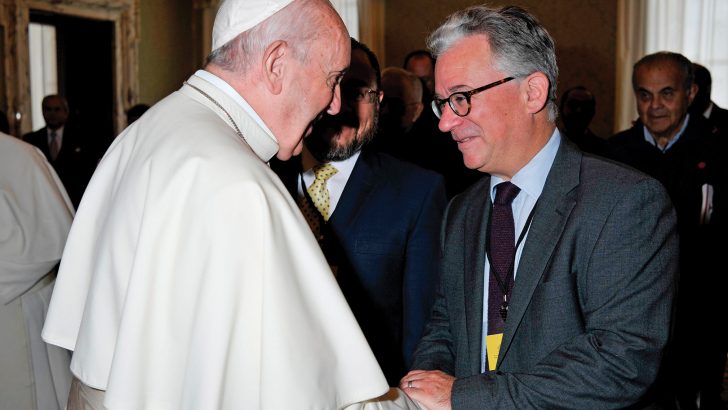One would have thought that every possible literary item from the present pope’s early years would have been brought to our notice. But this seems not to be the case, for here is a book, brought to us from those days in Argentina which will arouse great interest.
How it came to be written needs a little explanation. Ivereigh points out that the life of Pope Francis falls into three distinct periods: his time as a Jesuit, his time as the Archbishop, then Cardinal Archbishop of Buenos Aires, and last the time after his election to the Papacy.
In those early years he had a popular reputation as a retreat director. The material mainly utilised by Ivereigh in the creation of this book are the largely unpublished retreat notes from his Jesuit period, but they are strongly supplemented by references to more recent documents and allocutions, which express the Pope’s concern with ecology and the development of synodality.
Traditional
In layout, the creator follows the plan of the traditional eight day Ignatian retreat. This provides the framework for the text, but these pages are supplemented by points for reflection, sets of spiritual exercises, a paragraph pointing to contemplation, discernment and proposals.
These chapters are supported, however, by a user’s guide, an overview of the retreat as a whole detailing the themes, sections, references to the original exercise of Ignatius, and relevant texts from scripture and the Pope’s own teachings.
But that is not all: there is a coda which stresses, on leaving the retreat, what we can carry away into our daily lives, experiences that will indeed change, even transform, the retreatant.
Many people are distressed at times by the treatment the Pope receives, not just from his critics but from the press, seeking always to arouse conflict and controversy”
Taking an eight day Ignatian retreat will not be possible for everyone. But in the text this is contrasted with those healing weekends or retreats which are now so popular. They lay emphasis on self, but as is clearly underlined throughout the book Jorge Bergoglio, and by extension Ivereigh, are concerned not with self but with a relationship with God as a transformative experience.
Each reader will be struck by different parts of the book There are two other books referred to through the book: one is Robert Hugh Benson’s Lord of the World (1907) – one of the Catholic classics which can be obtained from the Cluny press, as mentioned last week.
Benson is a well known writer, long popular. But also much admired by the Pope, so much so that he constantly gives away copies, is a narrative of a migrant into Europe, a text for our times, entitled Little Brother: An Odyssey to Europe by Ibrahima Balde (London: Scribe, £12.99). On the recommendation of the Pope this certainly seems well worth reading.
Many people are distressed at times by the treatment the Pope receives, not just from his critics but from the press, seeking always to arouse conflict and controversy.
Responses
The Pope’s responses, or lack of them, are often commented upon. But there is a telling little aside in the book under the discussion of fraternity, concerning Archbishop Carlo Maria Viganò back in 2018. Francis, on a plane back to Rome, after the ‘scandal’ broke, suggests that the reporters follow their own vocation and investigate the matter for themselves.
So they did and quickly exposed the misinformation and indeed venom on the part of some involved in the uncharitable accusations. Sometimes silence can speak louder than words.
And these words of the Pope from Querida Amazonia, where Pope Francis explains that “conflict is overcome at a higher level, where each group can join the others in a new reality, while remaining faithful to itself”: wise words the world needs still to hear.
This is an amazingly rich book, which everyone, both believers or doubtful, can benefit from reading with patience and pondering with care.


 Peter Costello
Peter Costello Pope Francis meets author Austen Ivereigh at the Vatican in October 2019. The pope collaborated with Ivereigh on the book, "Let Us Dream: The Path to A Better Future." Photo: CNS
Pope Francis meets author Austen Ivereigh at the Vatican in October 2019. The pope collaborated with Ivereigh on the book, "Let Us Dream: The Path to A Better Future." Photo: CNS 